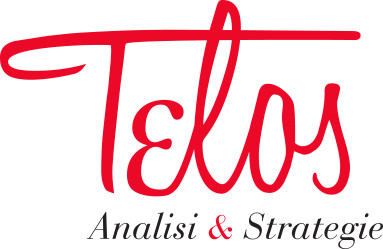November 2017, Year IX, no. 11
Alessandro Perego
Coming to grips with Industry 4.0
“The topic is fully integrated in the public debate, and even if politics were unable to independently assess its extent, it would still be forced to “come to grips with it”. Industry 4.0 - or Enterprise 4.0 - is the programme that can make not only Italian industry competitive again, but also the ecosystem of services that revolves around it (50% of the GNP)”.
Telos: Would you please explain what is Industry 4.0?
Alessandro Perego: The expression Industry 4.0 conveys a vision of the future in which digital technology will make industrial and manufacturing companies more competitive and efficient thanks to interconnection and cooperation between their resources (facilities, individuals, data), both in their factories and along their value chain. In practice, Industry 4.0 involves the use of certain innovative digital technologies, called Smart Manufacturing Technologies. We can divide these technologies into two big groups: the first, more close-knit and similar to Information Technology (IT), includes Industrial Internet (of Things), Industrial Analytics and Cloud Manufacturing; the second, more heterogeneous and close to the layer of Operational Technologies (OT), is represented by Advanced Automation, Advanced Human Machine Interface and Additive Manufacturing. Although these technologies are heterogeneous they share one important trait: they facilitate robust interconnection between the resources used in operational processes.
In the future envisaged by Industry 4.0, the facilities, workers, input materials and finished products will be equipped with sensors so that they can be identified and their position, status and activity be constantly monitored. The data will be analysed to improve production capacity, efficiency, safety and business continuity. Collaborative robots and new man-machine interfaces will enhance workers’ execution and decision-making abilities, thereby facilitating their work. Finally, a cloud platform will connect the whole facility to the rest of the production and logistics system and to the company’s clients. Data regarding the use of products will be employed to facilitate post-sales assistance, the creation of new products and services, and incorporate new business models.
In 2016 you commented that the Industry 4.0 Plan: “Will help us catch up, but it has to be monitored”. What are your thoughts now, one year later?
The Plan rested on two key pillars: innovative investments and the workforce to be up-skilled, reskilled through specific training. The first was aimed at stimulating investment in new technologies. The goal was to modernise production processes and introduce digitalisation and interconnection, thereby stopping the continuous loss of productivity vis-à-vis our competitors. This pillar was primarily characterised by the extension of super depreciation (140%), the introduction of hyper depreciation (250%) on capital goods, and a significant increase in the R&D tax credit. In my opinion the first goal has been more than accomplished; for example, the value of Industry 4.0 projects – the tip of an iceberg compared to more general investments in fixed capital – was 1.7 billion euro in 2016 (+25%), a figure that looks set to grow in 2017.
The second pillar envisaged the development and re-skilling and up-skilling of human capital in order to create a workplace which could socially and organisationally sustain comprehensive digital evolution and transformation in Italy. In fact, the Plan envisaged the dissemination of culture 4.0 throughout the entire educational cycle, from school to university and from higher technical institutes to doctoral courses. It also envisaged the creation of specific national Competence Centres. With the strong backing of university centres and national players, the aim was to implement innovative projects, trigger technological development, support the experimentation and production of new 4.0 technologies amongst SMEs, provide training, and create awareness about new manufacturing and digital technologies.
This second goal remains unaccomplished and is the main focus for 2018.
The effects of Industry 4.0 on the labour market are still vague: what measures should be taken to facilitate a painless conversion of skills?
There are no shortcuts. Study and training (i.e., “sweat and tears”) is the highway to convert skills. At all levels. What's more, new technologies obviously provide society with a huge opportunity to grow, but they are also a threat if the gap widens between those who are familiar with them and know how to use them, and all those who may have to “endure” them, be they entrepreneurs, workers, users or even nations. In other words, you have to really understand these new technologies and all their implications, good and bad. Education and training in all schools, from primary schools to university. The focus shouldn’t be on the technologies themselves - evolving at an unprecedented rate – but on the principles and models behind these technologies, the true basis of knowledge. But with a “nota bene”. People often say that there’s a huge gap between education and work. Maybe it’s true, but does it depend on education alone? I believe that the world of work misguidedly tends to want people who are already trained (plug&play); instead it should be looking for people with a solid foundation, who are able and ready to learn. People they can teach throughout their working life (ready to learn).
The campaign for Italy’s general elections in 2018 is about to start. What would you like to see included in the election programmes? Are you expecting anything, or is this topic still not part of Italian politics?
The topic is fully integrated in the public debate, and even if politics were unable to independently assess its extent, it would still be forced to “come to grips with it”. Industry 4.0, or, as recently reformulated, Enterprise 4.0, is the programme that can make not only Italian industry competitive again, but also the ecosystem of services that revolves around it (50% of the GNP).
What I expect to find in the Budget Law and upcoming election programmes is confirmation regarding the measures to encourage investments – which have already been shown to be effective, but still have to pan out in the long run – accompanied by much more effective measures involving training and skills (the famous Labour 4.0).
I’d also suggest that headway be made in two directions I believe to be crucial. First, reduce income tax to encourage investments in human capital. Second, encourage all initiatives that can boost the ability to tackle Industry 4.0 Innovation in Europe and not just Italy, for example the recently-established trilateral working groups Italy-France-Germany. Why? Because competition is played out between global ecosystems.
Marco Sonsini
Editorial
We’ve already reached the fourth, but haven’t yet taken in the third. The fourth what? The industrial revolution of course. Each revolution is different, but they’re all based on a technological break-through (steam, electricity, information technology) and they all trigger the same effect: a radical transformation of the world of work and disruption in social structures. Today, however, we no longer call it an industrial revolution, but Factory 4.0 or Industry 4.0 or, better still, Enterprise 4.0, a term suggested by our November interviewee, Prof. Alessandro Perego, a professor of Logistics and Supply Chain Management at the Milan Polytechnic and one of Italy’s leading experts in this field.
Business 4.0 is like similar topics such as Bitcoin or Blockchain: when you talk about them people nod as if they knew exactly what they were, but deep down they don’t know a blessed thing. So, Primo Piano Scala c took it upon itself to ask someone who not only knows all about it, but also knows how to explain it to us poor mortals. We discussed four issues with Prof. Perego: what is it; where does Italy stand; what sort of impact will it have on the world of work; and what would he ask politicians to do. The operative word is connection, not only between the facilities, people and data in a company, but also vis-à-vis the outside world. Perego says that it will increase competitiveness and efficiency, lead to the creation of new products and services, and provide more business opportunities.
One word of caution: it’s not simple automation, which already existed, but involves crossing the typical production technologies present in a facility with the ones of the information technologies from the consumer world. Italian authorities, actually the Ministry of Economic Development, only began to draft the Industry 4.0 Plan in 2016, but with specific objectives. According to Perego they have impacted positively on investments in innovation by Italian businesses, while very little has been done to develop people skills, the other load-bearing pillar of the Plan. And yet Enterprise 4.0 will cause momentous changes that will revolutionise the world of work, not only in facilities, but also among employees and white-collar workers.
The figures are mind-boggling, so much so that at the last Davos Forum participants tried to find answers to the following two questions: ‘How to prepare for the challenges the digital transition is opening up in the world of work? How can we mitigate the threats posed by technologies and ensure inclusion in society? The Future of Jobs study by the World Economic Forum reports that five million jobs will be lost before 2020 in 15 big countries. We are lagging behind in what Perego calls the famous sweat and tears, i.e., our support of training and education, so crucial in the retraining of the workforce. And yet, others realised this a long time ago.
Let’s take the Germany: Industrie 4.0 plan drawn up quite a few years earlier: the leading proponent is the Ministry of Education, while in Italy this Ministry is in third place. After the Ministry of Labour, is the objection we’re expecting. But if, as Perego maintains, we don’t encourage businesses to invest in training, we don’t create skills centres in universities, and we don’t begin to train our children when they’re in primary school, then will we find ourselves having to deal not only with the problem of retraining our existing workforce, but with a new workforce that is untrained. And finally, what does Perego expect from politics?
He hopes to find ‘confirmation regarding the measures to encourage investments (...) accompanied by much more effective measures involving training and skills (the famous Labour 4.0)’. We’ve got good news for him. Although not all the incentives in the National Plan Enterprise 4.0 have been confirmed, new funds have been earmarked for training: the tax credit for 4.0 training is 40% (250 million euro) and more resources have been allocated to the improvement of higher technical institutes (35 million): it’s not much, but at least it’s something. So long as the money is spent well.
Mariella Palazzolo

Alessandro Perego is a full professor of Logistics and Supply Chain Management for the Management, Economics and Industrial Engineering degree course at the Milan Polytechnic where he is Deputy Head of Department. He also directs the IoT Lab at the same polytechnic and is the Scientific Director of the Digital Innovation Academy. He is a true son of the Milan Polytechnic where he graduated in 1994 and where he has spent his whole academic career, save for a brief spell in Brescia between 1996 and 2001. His research activities have focused on two main topics: the design and management of logistics systems, and the role of ICT technologies in logistics and supply chain management.
He is the author and co-author of more than 100 publications about digital-based innovation and the design and management of logistics and production systems. His publications include articles in international magazines (e.g., International Journal of Production Research, International Journal of Project Management, Journal of Cleaner Production, International Journal of Physical Distribution and Logistics Management, Supply Chain Management, International Journal of Production Economics, Food Policy, International Journal of Operations & Production Management) as well as presentations in Italian and international conferences. He is also a referee for several international magazines.
Born in Milan, Alessandro is 48 years old, married with two children. His interests? ‘Very ordinary’, he answers, ‘football, running, reading and mountaineering’. Not to mention his civil commitment. Perego is a Founding Member and Board Member of the Fondazione Banco Alimentare. Very little about him is ordinary.
Marco Sonsini







SocialTelos